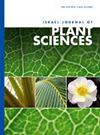盐胁迫对柳无性系形态生理解剖特性的影响
IF 0.7
4区 生物学
Q4 PLANT SCIENCES
引用次数: 0
摘要
本研究的目的是评估和量化盐胁迫对影响柳属无性系生物量生产的关键形态生理性状的影响。2021年2月,选用5个柳属无性系的茎插条进行盆栽试验。试验采用全随机设计(CRD),共4个重复。在生育期分别处理0、20、40、60和80 mM NaCl处理。每隔2个月,即5月、7月和10月,记录无性系的生长和生理特性观察。在试验结束时记录生物量参数。所有生长性状和生物量性状均随盐度的增加而显著降低。生理性状中,总叶绿素、类胡萝卜素和相对含水量均显著降低,而脯氨酸、总可溶性糖、总可溶性蛋白含量和Na+/K+比值均升高。在较高的盐度胁迫下,所有无性系的POD和SOD酶活性均升高。综合平均性能,无性系UHF-03在80 mM处生长和生物量积累最佳,耐盐性最强。扫描电镜(SEM)和能谱(EDS)图谱证实了柳根和叶在盐胁迫下的解剖变化和Na积累。本文章由计算机程序翻译,如有差异,请以英文原文为准。
Effect of salt stress on morpho-physiological and anatomical attributes of Salix clones
The aim of the study was to assess and quantify the impact of salt stress on key morpho-physiological traits that influence biomass production in Salix clones. In February 2021, a pot experiment was conducted using stem cuttings of five selected Salix clones. The experiment followed a Factorial Completely Randomized Design (CRD) with four replications. The clones were subjected to different levels of NaCl treatments (0, 20, 40, 60, and 80 mM) during the active growth period. The observations on growth and physiological characteristics of clones were recorded at an interval of two months after initiation of salinity treatments i.e., May, July and October. However, the biomass parameters were recorded at the end of experiment. All the growth and biomass traits showed significant reduction with increase in salinity treatments. Among physiological traits significant reduction were observed in total chlorophyll, carotenoids and relative water content, while salinity stress raised the content of proline, total soluble sugar, total soluble protein and Na+/K+ ratio in all the clones. The enzymatic activities of POD and SOD increased in all the clones when subjected to higher levels of salinity stress. On the basis of overall mean performance, clone UHF-03 showed optimum growth and biomass accumulation at 80 mM and was found to be the most tolerant to salinity stress. SEM and EDS mapping confirmed anatomical changes and Na accumulations in the roots and leaves of Salix in response to salinity stress.
求助全文
通过发布文献求助,成功后即可免费获取论文全文。
去求助
来源期刊

Israel Journal of Plant Sciences
生物-植物科学
CiteScore
1.90
自引率
0.00%
发文量
17
审稿时长
>12 weeks
期刊介绍:
The Israel Journal of Plant Sciences is an international journal of extensive scope that publishes special issues dealing with all aspects of plant sciences, including but not limited to: physiology, cell biology, development, botany, genetic
 求助内容:
求助内容: 应助结果提醒方式:
应助结果提醒方式:


